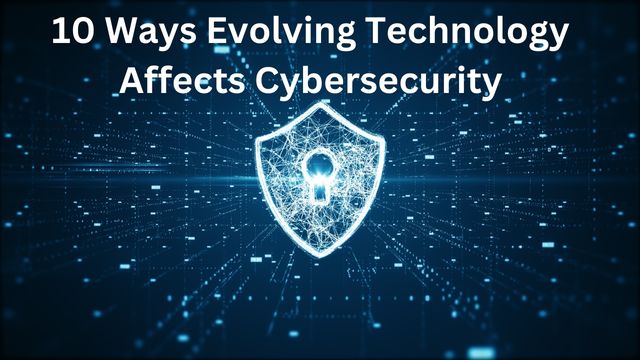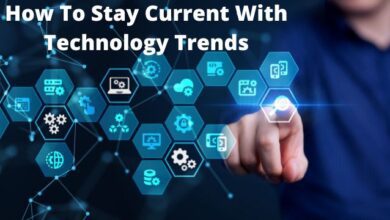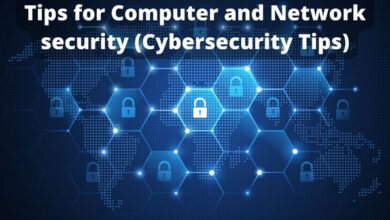10 Ways Evolving Technology Affects Cybersecurity

Technology affects Cybersecurity- Cybersecurity is more impacted by the rapidly changing digital era than most people think. Cybercrimes are increasing dramatically, which is in line with the development of technology.
The frequency and sophistication of cybercrimes increase along with technological advancement. Thankfully, as technology has developed, so too can we prevent cybercrime from happening and defend individuals when they do.
Here are some ways that technology development has altered cybersecurity.
10 Ways Evolving Technology Affects Cybersecurity
- Spear Phishing
- Data has Gone Digital
- Hacktivism
- Corporate Security Breaches
- Social Media Security Breaches
- Advanced Employee Training
- Botnets
- Identity theft
- MIM Attacks
- Secure Application Development Skill
Spear Phishing
Spear phishing scammers typically want information for financial gains, such as trade secrets or private information, as opposed to standard phishing emails that target random recipients. Hackers can collect personal information by targeting employees with emails that look to be from coworkers within their firms.
This practice is known as spear phishing. Hackers can send emails to employees pretending to be other business members thanks to advanced technology, which poses a serious cybersecurity concern.
Data has Gone Digital
Hard copies of documents are becoming less and less prevalent because almost everything is now digital. The majority of data is kept on a shared network, albeit it is frequently password-protected. As a result, a hacker might get access to the network and acquire crucial information, endangering people or businesses.
A further cybersecurity risk arises as more firms use cloud computing and store documents and information on cloud networks. Many firms find this approach appealing because cloud computing and storage are so productive and economical.
To safeguard data in the cloud, however, some complex security procedures must be implemented. Companies must put security measures in place to combat changing patterns even as this technology is always evolving.
Hacktivism
A few cases of hacktivism in 2012—the act of hacking for political or social reasons—have occurred. To impact as many individuals as possible, hackers are taking the practice to the next level and attempting to access websites with lots of visitors accessing information. These kinds of actions pose a greater threat to cyber security for big businesses and websites.
Corporate Security Breaches
The majority of these business security lapses happen when hackers take advantage of employees through deception and social engineering. Since hackers can access secured files and data thanks to technological improvements, they pose a serious cybersecurity danger.
Hackers are growing more adept at locating gaps and flaws in corporate security systems. Regrettably, 2012 might set a new record for corporate security lapses.
Social Media Security Breaches
Social networking platforms not only provide hackers access to personal data, but some of them may also reveal your precise location at any moment. Furthermore, if someone is aware of your whereabouts, they are also aware of your absence.
For instance, Foursquare, a social media platform, allows users to “check in” at the locations, they frequent, including restaurants, movie theatres, and places like work and school. By entering into the social network and viewing your profile, anyone may quickly determine where you are and what time it is. Your valuables and safety may be at risk if you have a home base indicator that you are not there.
Mobile cybersecurity vulnerabilities are constantly evolving along with mobile technology. Nowadays, smartphones—which can store more data than the more traditional older models—are owned by 45 percent of cell phone users.
Every new phone, tablet, and mobile device provides a chance for a cyber attacker to obtain a person’s sensitive information. Sharing charging ports with others can lead to malware problems for a variety of devices, as many mobile devices can be plugged into PCs to be charged.
Advanced Employee Training
As was already mentioned, the growing smartphone market has made people more technologically literate and in need of education as time goes on. The personnel of the organization should receive the appropriate training so that they are aware of cybersecurity threats and how to protect themselves. Employees can consequently use this information to obtain information from their employers through databases, the cloud, or shared servers within the organization.
Botnets
A botnet is a collection of computers that have been set up to send data (such as spam and viruses) to other computers. In the past, email and password credentials were collected by botnets, which served spammers well.
But as technology has developed, more data is being collected from computers by botnets, including name, address, age, financial information, online behavior, and more. They will then compile your data and sell it to third parties.
Spammers can get so many email addresses because a variety of businesses and companies buy and sell personal data. Personal data is especially susceptible due to the security risks posed by these sophisticated botnets.
Identity theft
Social media is being increasingly used by cybercriminals to conduct identity theft schemes, lure victims into downloading harmful software, and obtain passwords.
Hackers with experience may quickly access users’ social media accounts and utilize that data to access your email, work email, and financial information.
The typical user posts a lot of personal information on social media platforms; the majority of posts include the user’s name, age, birthday, hometown, and relatives, while a few also include addresses, phone numbers, and even real-time location updates.
Just enough of this information may be disclosed for a hacker to seize the chance to take your identity online.
MIM Attacks
The attack is a Man-in-the-Middle one. This technique involves a third party discreetly listening in on a conversation between two or more people. This makes it possible for someone to monitor all of your correspondence.
The security of personal data has been seriously breached. An attacker can prevent people from exchanging phone or text messages, leaving them open to further intrusions.
Today’s attackers can get beyond the cybersecurity around digital platforms because they have access to better technology. We must employ the same technology to defend sensitive and private data from such attackers.
Secure Application Development Skill
Nearly all companies these days have a website and a mobile app. The information is highly sensitive to privacy concerns, with just a small portion of it being accessible to the general public. Sometimes, developers fail to take security into account during the design phase. Businesses would require individuals who can provide a secure interface for their online presence across all platforms and devices.
Why is technology important in cyber security?
Cybersecurity is essential because it protects all forms of data from loss and theft. Intellectual property, personally identifiable information (PII), sensitive data, protected health information (PHI), individually identifiable information (PII), sensitive data, and corporate and government information systems are all included.
How cyber security is evolving?
Threats and countermeasures to those threats drive the evolution of cybersecurity. Nowadays, cybercriminals have more creative methods to carry out more damaging attacks. Companies have had to reconsider their cybersecurity plans this decade. With the development of the cloud and IoT, cybercriminals are now breaking into our networks.
- What Makes Hyperautomation the Top Technology Trends in 2022
- The Future of NavIC Satellite Navigation System in 2023
- The Connection Between 5G and Happiness
Conclusion
The fast-evolving digital era has a bigger impact on cybersecurity than most people realize. Thanks to modern technology, hackers can send emails to employees pretending to be other company members, which is a big problem for both cyber-security professionals and cyber criminals.
Hackers are advancing the practice by attempting to gain access to websites with a high volume of users accessing data. According to security expert Alex Vatanka from McAfee Security Labs, hacktivism may pose a greater threat to online safety for large companies and websites.
People are becoming increasingly digitally educated and in need of education as a result of the expanding smartphone market.








🙏 🙏 ❤ ❤ Always be updated with computer tips, mobile tips, how to fix, tech reviews, and tech news on Rowdytech, or subscribe to the YouTube channel.